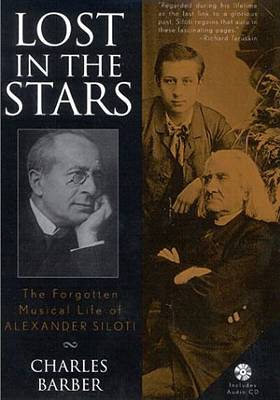|
WHIRLWIND OF ACTIVITY

GORDON RUMSON recommends
Charles Barber's book 'Lost in the Stars:
The Forgotten Musical Life of Alexander Siloti'
History is a malleable thing. Each era has its own history; the things about the past it deems important. Some things are buried only to resurface many years or even generations later. Goethe said that history belongs to those who leave a clear record.
The life of Alexander Siloti is a case in point. Esteemed highly in his own lifetime (1863 to 1945) Siloti disappeared from musical history evading even a footnote in most books. But how can this be? A prodigious pianist, student of Franz Liszt and Nicholas Rubinstein, friend and colleague of Tchaikovsky, Scriabin and Rachmaninoff, prolific editor and arranger, organizer of an astounding series of concerts in St Petersburg and eventually faculty member at no less than the Juilliard School of Music, how can he have faded from recognition so quickly -- indeed faded in his own lifetime?
Before answering that question, we must know who this musician was. Charles Barber sets out upon that task with evident love of the subject. His first encounter was at a Gilels recital where that master played a transcription by Siloti. So magical was it that it launched Barber upon his remarkable search for more music and the fragments of a biography. His diligence is extraordinary, for the data was scattered, where it had been collected at all. Even those amazing St Petersburg Concerts -- where an extraordinary array of artists and composers were presented -- were sadly forgotten.

'Lost in the Stars: The Forgotten Musical Life of Alexander Siloti' by Charles Barber. © 2002 Rowman & Littlefield
|
Barber tells a great story and a wonderful, though sad tale it is. Siloti studied first with the renowned Nikolai Rubinstein, brother of Anton, and himself the first director of the Moscow Conservatory. Later, Siloti went to study with Liszt (and left an important recollection of the time). Siloti moved in the most rarefied circles and his contacts were not mere passings in the night, but deep and profound. Siloti was closely associated with Peter Tchaikovsky for the last decade of that composer's life and he and Siloti collaborated on numerous projects, editions and performances. The connection was real and deeply felt on both sides. Siloti's changes to the Tchaikovsky concerto are a direct fruit of this contact (and this issue of contact will be discussed below).
The rise to prominence of Rachmaninoff owes a great deal to Siloti who performed his music, and supported him in many ways -- financially, professionally, morally and musically.
Continue >>
Copyright © 22 November 2003
Gordon Rumson, Calgary, Canada

|

